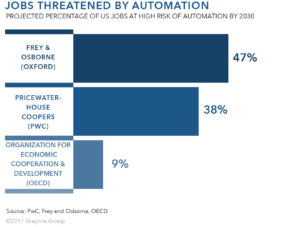Universal Basic Income? How About Universal Basic Prosperity Instead?
“For myself I am an optimist – it does not seem to be much use to be anything else.” – Winston Churchill
Elon Musk recently made headlines by joining the call for a “Universal Basic Income.” The premise of the idea is that so many jobs will be lost to the coming “robot apocalypse,” where cheap, pervasive robots and/or AIs will replace a myriad of jobs, that countries will need to provide a base income for those who cannot find work. Multiple studies, mostly compiled by people who have never had to actually get something made or justify a capital expense, suggest that somewhere in the range of 40-50% of activities humans are now paid to do will be replaced by machines by 2030.
On the surface, that sounds intimidating, but drill down a little and the details paint a slightly different picture. McKinsey notes that only about 5% of all occupations can be completely automated. For another 60% of occupations, 30% or more of their existing activities can be automated. In other words, productivity for these occupations, ranging from physicians to CEOs, will improve. Historically, every wave of automation that improved productivity ultimately increased prosperity and jobs. Think of things like the cotton gin, harvesting machines, and the automotive assembly line as old school examples, or the desktop PC and the internet as more modern examples. (Facebook and YouTube offset some of that productivity increase, didn’t it?) Want to hear what productivity improvements, technology, and the resulting prosperity does to the common man? There’s a song about that, which speaks directly to my own roots. Even as rural farm jobs were eliminated in the Depression-Era South, going to work for “the TVA” let people buy their “washing machines and Chevrolets,” often as not the first of each technology that they had ever been able to afford.
But that’s not the entire picture. Worldwide, especially in the economically developed countries and in many of those well on their way to being developed, the overall population is aging and birth rates are falling. Did you know that 64% of all US labor union employees are over 45? By the time 2030 rolls around, 46% of the 1.4M people in the US making motor vehicles or their parts will have retired, or will be within a 1-2 years of retirement. The government is in even worse shape, facing what is referred to as the “Silver Tsunami” of retirees over the next decade. Meanwhile, the US labor force is shrinking. In fact, by 2020, for the first time in history people aged 65 and over will outnumber children under age 5. Furthermore, this is a global problem, with impact being the highest in Japan and Western Europe. Longer range, global population is expected to reach zero growth sometime within the next century. Even as overall population growth slows, the number of people of working age will also be shrinking relative to those beyond working age. Think GDP growth will fall to zero too? Think again.
Now, consider that worldwide, the number of people living in extreme poverty has declined by 1.1 billion since 1990, despite an overall global population increase of 1.9 billion. People are being lifted out of poverty at a greater rate than at any time in history, thanks largely to the spread of free market reforms and also to the fall of communism. The whys aren’t important though. What is important is that this is a scenario where all boats rise. As people are lifted out of poverty in these countries, a middle class is being created, and what is the middle class going to do with all that newfound wealth? Spend it, of course. Whether the product is a new car, a new scooter, a new home, or just going out to the movies, all that energy, construction, infrastructure, machines to build it and equipment to maintain those machines, raw supplies…right down to the food cart/truck vendor feeding workers – it all has to come from somewhere. But with a globally aging population, and the shrinking workforce that comes with it, who will make all that stuff?
The bottom line you can take away from this is that we had BETTER drastically improve productivity! There won’t be a need for a universal basic income, because we can’t implement productivity improvements as fast as many in the tech world think we can, and the technology never advances as fast as you want it to in the messy real word. Today’s CPUs and even their mechanical and vacuum tube predecessors have followed Moore’s Law with near perfection, but the things that those CPUs do didn’t keep up the pace as soon as the 0s and 1s left their pins and headed for the GUI.
Source: U.S. Census Bureau
Job Displacement vs. Job Replacement
I can put together a gorgeous presentation today on my Mac in hours that would have taken an army of secretaries, graphic artists, and other helpers 25 years ago. What happened? Did all those jobs go away? Nope, today we just have that many more PowerPoints running around, along with the meetings required to present them, the huge democratized market for canned graphic art that was created, the energy needed to keep those conference rooms cool, the R&D that went into the Mac, the projector and the web conferencing software (that STILL doesn’t work), the people to fill those conference rooms, ad infinitum.
In the meantime, with rising needs worldwide for goods and services, combined with a shrinking, or at best, stable, workforce, you can bet that companies big and small will be racing to meet those needs, be it with robots or people or, most likely of all, both! I have also put together some thoughts on specific examples of jobs that will be subject to automation and how they’ll change. Here’s a hint – the jobs won’t go entirely away, and more new jobs will be created than lost.
Join the Catalyst Monitor
Join our community, where we push out regular insights to help maintain situational awareness on technological and socioeconomic trends.




